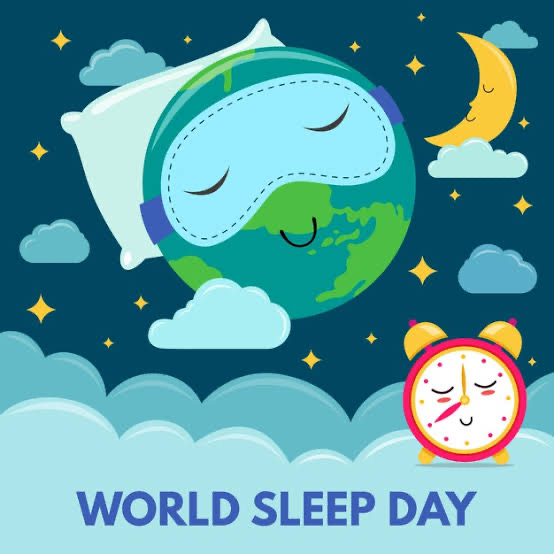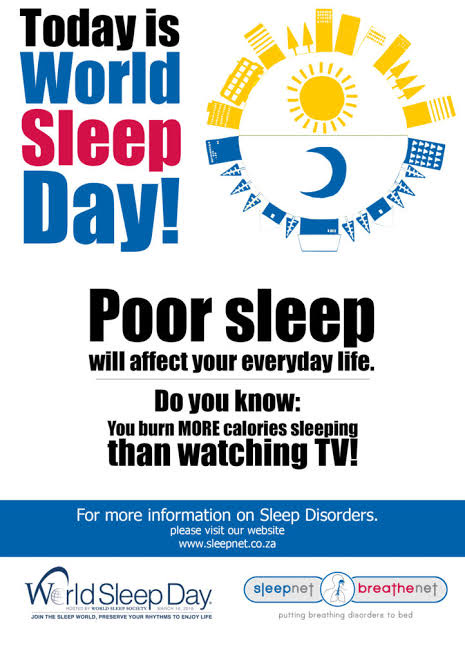It is Friday, 19 March 2021
(W11/D78/287 rem)
Today is: 
 World Sleep Day
World Sleep Day 
It seems like we’ve just celebrated Nap Day, and here we are, observing it’s big brother -  World Sleep Day
World Sleep Day  - and again highlighting the importance of getting enough good quality sleep.
- and again highlighting the importance of getting enough good quality sleep.
World Sleep Day is an annual event intended to be a celebration of sleep and a call to action on important issues related to sleep, including health and medicine, education, social aspects and driving.
It is organised by the World Sleep Day Committee of World Sleep Society and aims to lessen the burden of sleep problems on society through better prevention and management of sleep disorders. World Sleep Day is held the Friday before the (Northern hemisphere) Spring Vernal Equinox.
Personally, I’ve been struggling with sleep for a long time, and don’t get nearly enough of it. It’s been compounded over the last few days by all the irritating load shedding nonsense. My sleep tracker app tells me that my average time asleep in the last week is under 4 hours.  And I know I’m not alone as the recent conversation in Thread Killer suggests.
And I know I’m not alone as the recent conversation in Thread Killer suggests.

When you consider that even 6 hours a night is not enough, it’s clear that many of us, myself especially, could benefit from a greater understanding of sleep, it’s importance, and how we can develop better sleep habits.
That is pretty much the entire aim of  World Sleep Day
World Sleep Day  .
.
Sleep may seem like such a normal aspect of life that it might seem silly to even talk about it! It can be one of the most banal, underrated aspects of people’s lives. But for those who have recurring sleep problems, getting enough sleep can be a real challenge and affect everything else in life.
World Sleep Day aims to consider and aid those who have sleep problems. It is useful for educating people all over the world about the importance of sleep, as well as changing the way people view and experience sleep by giving them valuable resources to help them in their daily lives.

Hosted since 2008, World Sleep Day is a global awareness act that celebrates sleep and aims to help those with serious sleep problems. Celebrated on the Friday before Spring Vernal Equinox of each year, this holiday has an annual 155 events held across the world and is participated by over 70 countries.
World Sleep Day focuses on various issues related to sleep, sleep medicine, education about sleep, and the social effects that sleep deprivation can have on everyday life. From mild to severe, sleep difficulties are a modern problem that may have the ability to hijack people’s entire lives if not kept in check.
According to the American Sleep Association, over 50 to 70 million people have some type of sleeping disorder, over 25 million have sleep apnea, and the most commonly reported sleep problem is insomnia (the inability to sleep at all or for a full night).
So what can you do to improve your sleep? Develop a good sleep hygiene routine habit and stick to it.
Because children so naturally fall asleep when they are tired, adults may simply assume they should be able to do the same thing. But they often cannot! Just like taking care of the physical body (by showering or brushing the teeth), a person’s sleep routine may need a little bit of extra attention and care.
The process of sleep hygiene allows the brain and body to quiet themselves and prepare for a good night of sleep. This includes healthy habits and relaxation routines such as:
- Fixed bedtime and wake time: the circadian rhythms of the body work better when bedtime and wake time is the same each day.
- Exercise: people who don’t have enough physical activity during the day may struggle to sleep at night, so be sure to take a brisk walk or practice other cardio several hours before bedtime.
- Cut back on caffeine: as a stimulant, caffeine can make the mind and body active, so it’s best to avoid coffee, tea or other caffeinated beverages at least 6 hour prior to bedtime.
- Room temperature: keep the bedroom between 16°C - 20°C.
- Give yourself 30 minutes for your bedtime routine: instead of expecting to fall asleep right away, calculate half an hour to wind down with soft music, light stretching or reading a boring book.
- Dim the lights: tell the brain it’s time to sleep by lowering the lights.
- Unplug: At least 60 minutes prior to bedtime, turn off the computer, television, smartphone or other devices as the blue lights can interfere with good sleep rhythms.
- Practice meditation: deep breathing and mindfulness practices before bed can help the brain to release the stress of the day which sets the stage for better sleep.
For more information on  World Sleep Day
World Sleep Day  , it’s aims and tools available to help you sleep better, visit https://worldsleepday.org
, it’s aims and tools available to help you sleep better, visit https://worldsleepday.org
So, you have permission to get back into bed, to go back to sleep, and to have a restful Friday! 


 Good morning!
Good morning! 

